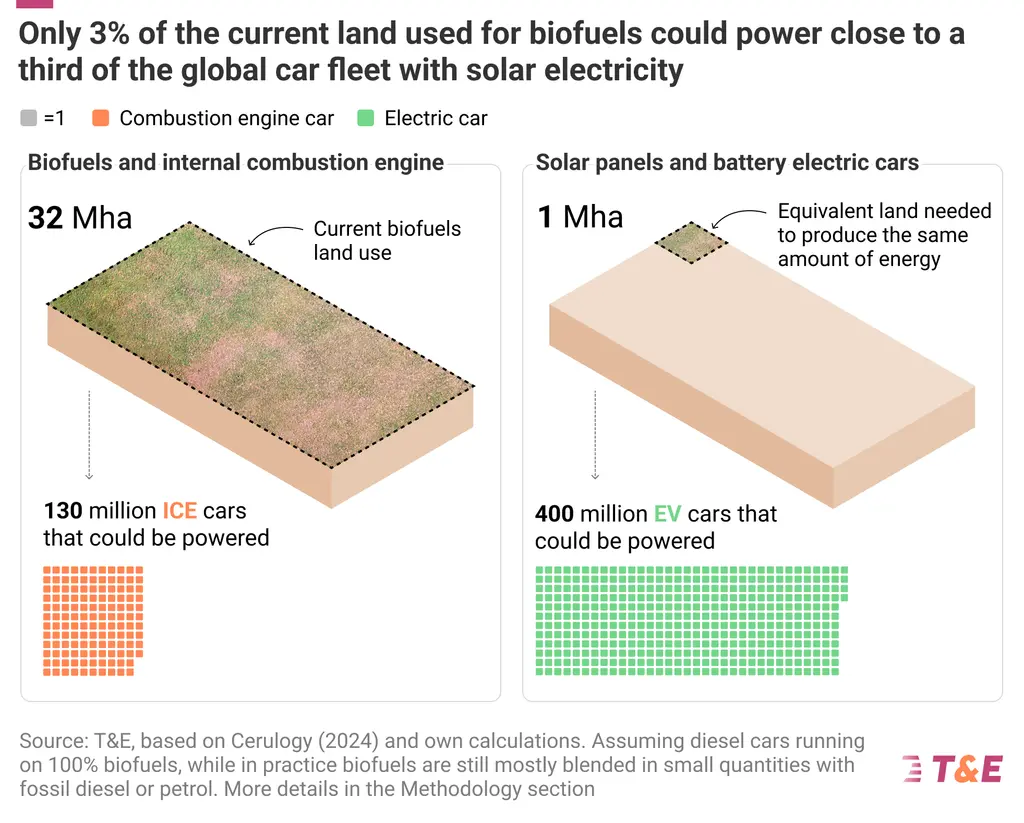25% World's vegetable oil is burned for biofuels
3% Of the land currently used for biofuels could produce the same amount of energy with solar panels
-
By 2030 biofuels crops will require land the size of France, which would make it the sixth largest country in terms of arable land use globally.
-
Today, the equivalent of 100 million bottles of vegetable oil are burned in cars every day, meaning a fifth of all vegetable oil is never even used for food.
-
On average, 3,000 litres of water are needed to drive 100 km on biofuels.
-
Just 3% of the land currently used for first-generation biofuels could produce the same amount of energy with solar panels.
Global biofuels production emits 16% more CO2 than the fossil fuels it replaces, a new Cerulogy report on behalf of T&E shows. The same land could feed 1.3 billion people, while using just 3% of that land for solar panels would produce the same amount of energy. With demand set to rise by at least 40% by 2030, T&E calls for global leaders meeting in Brazil for COP30 to agree to limit the expansion of a climate solution that is doing more harm than good.
Today, growing crops to be burned as fuel uses up 32 million hectares of land - roughly the size of Italy - to meet just 4% of global transport energy demand. By 2030 this is set to grow by 60% to 52 million hectares - the size of France.
Biofuels are responsible globally for 16% more CO₂ emissions today than the fossil fuels they replace due to the indirect impacts of farming and deforestation. By 2030, biofuels are projected to emit 70 MtCO₂e more than the fossil fuels they replace, equivalent to the annual emissions of almost 30 million diesel cars.
This is a massive waste of land, says T&E. Using just 3% of this land for solar would produce the same amount of energy. As electric vehicles are much more efficient than fossil fuel cars, that 3% of solar energy would be enough to power close to a third of the world’s current car fleet.

Cian Delaney, biofuels campaigner at T&E: “Biofuels are a terrible climate solution and a staggering waste of land, food and millions in subsidies. Ensuring a sustainable balance between agriculture and nature is essential to tackling the climate crisis, and burning crops for fuel only pushes us further in the wrong direction. Using just 3% of the land we currently use for biofuels for solar panels would produce the same amount of energy. That would leave a lot more land for food and nature restoration. Governments around the world must prioritise renewables over crop biofuels. ”
Despite advanced and waste biofuels being increasingly promoted as cleaner solutions, the analysis shows that 90% of global biofuel production still relies on food crops. In 2023, the biofuel industry consumed around 150 million tonnes of corn and 120 million tonnes of sugarcane and sugarbeet. In total, the equivalent of 100 million bottles of vegetable oil are burned in cars every day, meaning a fifth of all vegetable oil supply is never even used for food. The energy in all these feedstocks could meet the minimum calorific requirements of up to 1.3 billion people.
T&E’s analysis shows that biofuel crops require significant amounts of freshwater. Driving a car 100 km on first generation biofuels would require on average close to 3,000 liters of water, while only twenty litres would be needed to run an electric car on solar electricity. As climate change puts increasing pressure on water supplies, this could be a disaster, warns T&E.
Brazil is one of the fastest growing biofuels producers and is catching up with the US - the world’s biggest biofuels producer. The country recently decided to suspend its soy moratorium, which protects deforestation in the Amazon from soy cultivation. Canada and India are also among those set to massively increase their production. T&E’s analysis is based on existing government policies and strategies, however, demand for biofuels could also see a massive spike for use in shipping and aviation as part of their efforts to find alternatives to fossil fuels.
“Brazil’s decision to lift its soy moratorium looks increasingly concerning in light of this biofuels expansion. As host of this year’s COP, we can expect Brazil to push for more renewable fuels, but biofuels should not be part of the discussion. Otherwise we risk doing more harm than good,” concluded Cian Delaney.
T&E calls on governments to better safeguard against biofuels that contribute to land clearance and deforestation when making climate policies. Public funds should prioritise smart electrification, efficiency and truly sustainable alternatives, not false solutions, says the group.




